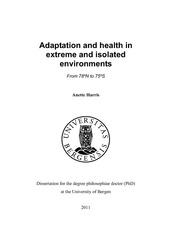Adaptation and health in extreme and isolated environments: From 78ºN to 75ºS
Doctoral thesis
Permanent lenke
https://hdl.handle.net/1956/4887Utgivelsesdato
2011-06-07Metadata
Vis full innførselSamlinger
Sammendrag
The main purpose of this thesis was to explore the variation in health, diurnal cortisol rhythm, and performance related to working and living in extreme and isolated environments. The thesis consists of three papers that all deal with this topic, but the populations and environments differ. The first paper is based on a study of workers on a small oil rig in the North Sea. In the second paper, workers who constructed a tunnel in the Arctic region of Svalbard (78º north) were studied. In the third paper, personnel overwintering in the Antarctic (67º and 75º South) were studied. At regular intervals all participants filled out questionnaires, did performance tests, and sampled saliva for the analysis of cortisol. All participants were able to keep a normal cortisol rhythm, maintained good health, and good performance, independent of the environment they lived in. One exception was that overwintering personnel in the Antarctic complained more about tiredness and sleep problems half way thru their stay, possibly because of boredom in this isolated environment. These highly selected men and women coped very well under extreme isolation and extreme external environments. The oil rig workers were also tested for potential effects of “swing shift”, during the day they shifted from night work to day work. This had no negative effects on health or on performance measured as reaction time. Similar results were found for construction workers in the Arctic. Extended work hours and the extreme change in external light, had no ill effects on diurnal rhythms, performance, or subjectively reported health complaints. The only deviation from normal rhythms was that during the period with 24 hours darkness, employee’s working day had a lower cortisol response to awakening and, accordingly, less decrease during the day.
Består av
Paper I: Psychoneuroendocrinology vol 35, Harris, A., Waage, S., Ursin, H., Hansen Å.M, Bjorvatn, B., Eriksen, H.R., Cortisol, reaction time test and health among offshore shift workers, p. 1339-1347. Copyright 2010 Elsevier. Full text not available in BORA due to publisher restrictions. The published version is (also) available at: href="http://dx.doi.org/10.1016/j.psyneuen.2010.03.006.Paper II: Harris, A., Waage, S., Ursin H., Eriksen, H.R, Saliva cortisol levels in construction workers in the Arctic (78º N). Submitted to International Journal of Circumpolar Health 2010.
Paper III: Rural and Remote Health 10, Harris, A., Marquis, P., Eriksen, H.R., Grant, I., Corbett, R., Lie S.A., Ursin H., Diurnal rhythm in British Antarctic personnel. Copyright 2010 the authors. The published version is (also) available at: http://www.rrh.org.au/articles/subviewnew.asp?ArticleID=1351.
